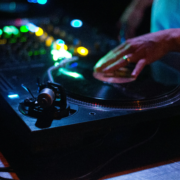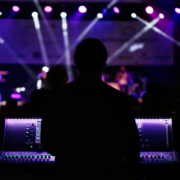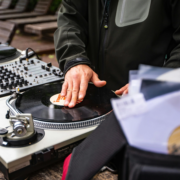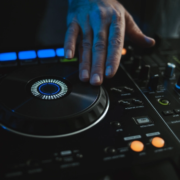In a world where music is often synonymous with booming speakers and vibrant lights, the concept of silent discos has emerged as a revolutionary trend. These unique events, where music is transmitted directly to wireless headphones instead of traditional speaker systems, have captivated audiences and opened up new opportunities for DJs to innovate. Silent discos are not just a quirky alternative—they’re a growing phenomenon that requires DJs to adapt their craft to an entirely different format.
In this article, we’ll explore the rise of silent discos, how DJs can thrive in this environment, and why these events are changing the way we experience live music.
What Is a Silent Disco?
A silent disco is an event where attendees wear wireless headphones to listen to music instead of relying on loudspeakers. These events typically feature multiple DJs playing on different channels, allowing listeners to switch between genres or sets with the push of a button.
Silent discos are popular in settings where noise restrictions are in place, such as:
- Urban areas with strict sound ordinances
- Late-night festivals or parties
- Museums, galleries, and other unconventional venues
For DJs, this format offers a unique challenge: creating an engaging set that competes not only with other DJs but also with the listener’s ability to change the channel.
Why Are Silent Discos So Popular?
1. Noise-Free Fun
Silent discos solve one of the biggest challenges of live events—noise complaints. By eliminating the need for speakers, they create an immersive experience without disturbing the surrounding area.
2. Customizable Experience
Attendees can choose between multiple DJs or genres, tailoring their experience to their preferences. This flexibility adds a layer of interactivity that traditional events lack.
3. Unique Atmosphere
The sight of a crowd dancing in near silence is surreal and captivating. Once attendees put on their headphones, they’re transported into a world of sound, creating a shared yet individual experience.
How DJs Can Succeed at Silent Discos
Silent discos require DJs to adapt their approach to connect with the audience in this unique setting. Here are some strategies to master this format:
1. Understand Your Audience
Since attendees can switch channels at any moment, it’s crucial to keep your set dynamic and engaging. Pay attention to crowd reactions, even if you can’t rely on the usual feedback from loud cheers.
2. Focus on High-Quality Transitions
In a silent disco, every detail of your mix is amplified because attendees are listening through high-fidelity headphones. Mastering smooth transitions and creative beatmatching is essential.
3. Use Visual Cues
Without the booming sound of speakers to energize the crowd, DJs need to use visual communication. Interact with the audience through gestures, body language, and even lighting effects to create a connection.
4. Diversify Your Set
Silent discos often feature multiple DJs playing simultaneously. To stand out, experiment with unexpected genres or incorporate remixes and mashups that grab attention.
5. Collaborate with Other DJs
Silent discos thrive on variety. Partnering with other DJs to offer a range of styles can make the event more appealing. Coordinated efforts, such as theme-based sets, can also elevate the experience.
The Gear You’ll Need for a Silent Disco
To perform at a silent disco, DJs need to work with specific equipment tailored to this format:
- Wireless Transmitters: These devices send your audio to the audience’s headphones. Most silent disco organizers provide this setup, but it’s good to familiarize yourself with the technology.
- Headphones: High-quality headphones are a must for monitoring your mix, ensuring it matches the audience’s experience.
- Controller or Mixer: Compact, portable gear is ideal for silent disco events, especially those held in unconventional locations.
- Visual Elements: Since silent discos lack the auditory impact of traditional setups, visuals like LED displays or custom lighting can enhance your presence.
Why DJs Love Silent Discos
Silent discos aren’t just a novelty—they offer unique opportunities for DJs to grow and showcase their skills.
1. Experimentation
With diverse audiences switching between channels, DJs can test new genres or mixing techniques without fear of losing the crowd entirely.
2. Expanding Your Reach
Silent discos often attract a broad audience, from music festival-goers to corporate event attendees. This variety can help DJs build a more diverse fanbase.
3. Eco-Friendly Events
Since silent discos don’t require massive sound systems, they have a lower environmental impact. This aligns with the growing demand for sustainable entertainment.
Famous Silent Disco Events
Silent discos have found a home at some of the world’s biggest festivals and events:
- Glastonbury Festival: Known for its vibrant nightlife, Glastonbury features a popular silent disco tent that’s always packed with enthusiastic dancers.
- Burning Man: In a setting where creativity knows no bounds, silent discos add another layer of innovation to the experience.
- Urban Nightlife: Cities like New York and London host regular silent disco events in parks, rooftops, and other unconventional spaces.
The Future of Silent Discos
The rise of wireless technology and streaming platforms is likely to make silent discos even more accessible and innovative. Future trends might include:
- Interactive Sets: DJs could allow attendees to vote on the next track in real time.
- AR and VR Integration: Imagine combining silent discos with virtual reality to create fully immersive musical experiences.
- AI-Powered Playlists: Customizable playlists tailored to each listener’s preferences could become a game-changer.
Conclusion: Silent Discos as the Next Frontier
Silent discos are more than a passing trend—they represent a new way for DJs to connect with their audiences and push the boundaries of live performance. By embracing the challenges and opportunities of this format, DJs can expand their skill set and captivate listeners in an entirely new way.
Ready to take your DJing to the next level? Explore more tips, tools, and inspiration at mp4remix.com, where we help DJs thrive in an ever-changing industry.
Silent discos prove that sometimes, the most powerful music happens in silence—so grab your headphones, and let’s redefine the dance floor together!







